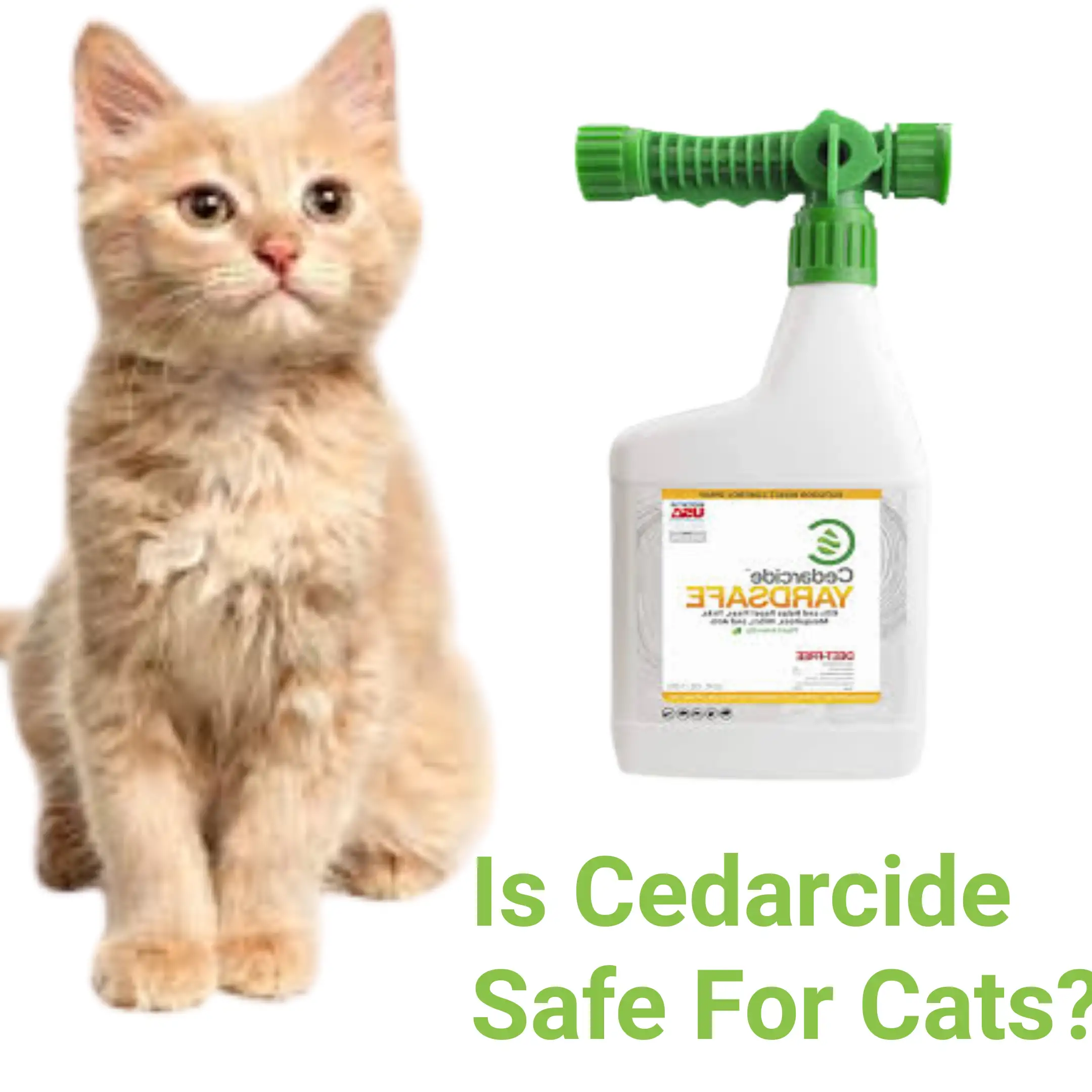Is Cedarcide Safe For Cats?

A very difficult task most of us cat owners usually face is being able to repel bugs while keeping our cats safe. We tend to look for a natural solution free from harsh or detrimental chemicals. Most companies would claim that their products are entirely safe, but this is not always the case, as they could contain additives or active ingredients that may react badly with our cats.
Is cedarcide safe for cats? Depending on the product we are looking at, cedarcide can be toxic to cats. The Cedarcide all-purpose bug spray contains 4.8% peppermint oil, and peppermint oil can be unsafe for cats even in small quantities. Besides that, the other inert and active ingredients used in their other products are safe and mostly natural.
In this piece, I am going to explore the products manufactured by Cedarcide and highlight their safety for your feline friend and the precautions you can take. Plus, I will be listing other safe natural alternatives.
Table of Contents
- Is cedar scent toxic to cats?
- Is Cedarcide safe for cats?
- Alternatives to Cedarcide for cats
- Final thoughts
Is cedar scent toxic to cats?
Usually, cats are repelled by harsh or pungent smells like that of black pepper used in lemon pepper seasoning. In some cases, we may use these pungent scents to our advantage, preventing a cat from accessing certain areas( just as I do with feral cats around my yard).
The good news is that, just like pine used in neutralizing old cat urine smell, the majority of cats are not repelled by cedar scent, making it easy to use cedar-contained products on them. Also, keep in mind that a few other cats may not appreciate this scent.
Is Cedarcide safe for cats?
Cedarcide is made from natural ingredients, with its main aim being to checkmate and eliminate different kinds of bugs. Its main ingredient is cedarwood oil, which has a distinctive scent and whose compounds are known for repelling a host of insects.
The effectiveness of certain Cedarcide products lies in the combination of certain natural oils like lemongrass and peppermint oil to repel ticks, fleas, mosquitoes, and certain types of ants. These oils disrupt the senses of these bugs, making it difficult for them to remain in that vicinity as they struggle to locate and stay on their prey.
Cedarcide has quite a number of products: All-Purpose Bug Spray, Outdoor Bug Control (Cedarwood), Outdoor Bug Control (Lemongrass), Cedarcide Original, and Cedarcide Pet Shampoo. While almost all these products are safe, I would like to explore the ingredients used in making them and highlight their safety for your cat. Please note that the peppermint oil was only used in the all-purpose bug spray.
The following are the ingredients used in Cedarcide and how they could impact your cat:
Peppermint oil
Most brands or pet products list peppermint oil on their label as menthol, and it is good to know that peppermint oil can be toxic to cats even if small quantities are ingested or inhaled.
This product is meant to eliminate bugs and should not be used in areas where your cat is present, or you can isolate your cat until the product has dried completely. Typical signs of toxicity include vomiting, nausea, lack of coordination, and a possible risk of liver failure.
The peppermint oil used in Cedarcide is extracted from plants that no toxic ingredients or pesticides were used to treat.
There is no measurement for the amount of peppermint oil that could be toxic to your cat; if you notice anything is not right, contact your vet or the ASPCA 24-hour hotline at (888) 426-4435.
Cedarwood oil
Cedarwood oil used in all Cedarcide products is not toxic to cats. Besides being safe for cats, cedarwood oil is a very effective killer of fleas, making it a great essential oil that you can use around cats.
With a few drops of cedarwood oil applied to your outdoor cat’s collar, fleas would be almost completely repelled while also reducing the number of possible ticks.
But you should be aware that not all cats enjoy the scent of cedar, and if your cat is one of them, you may not want to apply cedarwood oil to its collar.
Lemongrass oil
You will mostly find lemongrass oil in the form of hydrosol, a completely non-alcoholic scent that is derived from steam distilling matter. The good news is that lemongrass oil is very safe to use around cats, provided the concentration is low.
Like the lavender oil in pillow sprays, note that lemongrass oil should not be ingested or applied directly to your cat’s skin except in safe, tested quantities.
Soybean oil
Soybean oil is not toxic to cats and is often used alongside other oils in different anti-bug products to heighten the effect.
Other ingredients used include hydrated silica to stabilize the products, glycerin to moisturize and maintain formulas, sodium lauryl sulfate to enable water and oil to mix properly, isopropyl myristate to prevent formulas from having a greasy feel, polyglycerol oleate to aid oil to properly mix with water, ethyl llactate to prevent the ingredients from separating, sodium citrate to balance the pH of Cedarcide products, and mineral oil, which is tasked to deliver essential oil to the skin safely. All these ingredients are safe for cats.
Alternatives to Cedarcide for cats
- Diatomaceous earth
- Neem oil
- Vinegar
- Cedar blocks or chips
- The service of a professional pet exterminator
Final thoughts
The major takeaway from the topic “Is Cedarcide safe for cats?” is that you can safely use all the products of Cedarcide around your cat, but you should be wary of allowing your cat around areas where you used the all-purpose bug spray, as it contains peppermint oil, which could be toxic to cats.



